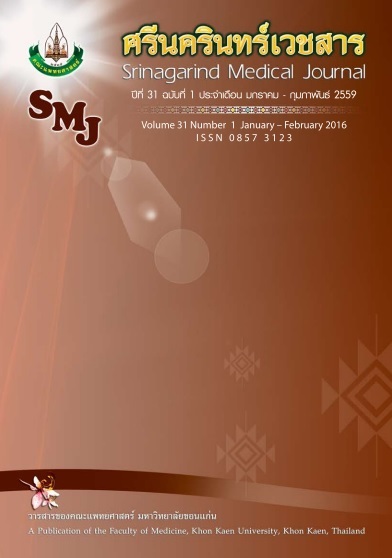Prevalence and Factors Associated with Depression among the Elderly Community Residents with Chronic Diseases in Samliam Urban Primary Care Unit, Khon Kaen
Keywords:
elderly, depression, chronic disease, primary care unit, KKU-DIAbstract
Background and Objective: In elderly people who have chronic diseases, there has been a rapid increasing prevalence of depression. However, the prevalence of depression among the elderly with chronic diseases in primary care of northeastern Thailand is not well studied. The purposes of this study were to study prevalence and level of depression by using a new valid and reliable screening instrument for depressive disorder “KKU-DI”, as well as their association among the elderly community residents with chronic deisease in an Samliam urban primary care unit of Khon Kaen.
Method: A cross-sectional descriptive study was conducted. One hundred and thirty elderly patients (age > 60) with chronic diseases at Samliam primary care unit of Srinagarind hospital were interviewed during August in 2014 - September in 2014. Instruments were used as the following: 1) questionnaire for demographic data 2) questionnaire for physical health, health behaviors 3) Barthel Activities of Daily Living (ADL) Index questionnaire 4) Khon Kaen University Depression Inventory (KKU-DI) for screening depression 5) questionnaire for family and social health of the elderly. Data analysis was conducted by frequency, percentage, prevalence rate with 95% CI, mean (standard deviation), Pearson’s chi square test, odds ratio and multiple logistic regression.
Results: The sample consisted of 130 subjects who registered in Samliam Primary Care Unit. The response rate was 100%. There were 92 (70.8%) females. Their mean age was 69.1±7.04years (range: 60 - 88 years). The prevalence of depression was 36.9% (95%CI:
28.5 – 45.3). The adequacy of incomeand frequency of participation in society were found associated with depression.
Conclusion: There was a high prevalence of depression in primary health care setting. The study revealed that one third of the elderly patients with chronic diseases had depression, and significantly related to adequacy of incomeand frequency of participation in society.




